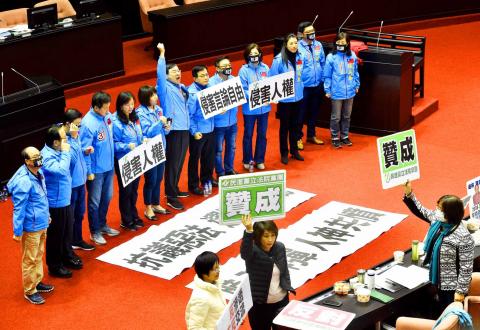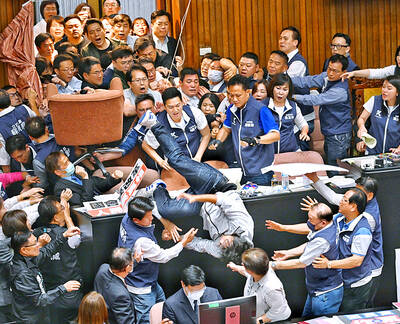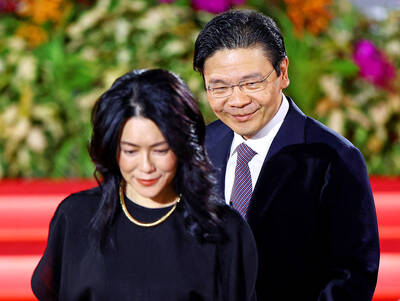The Democratic Progressive Party (DPP) caucus, which has a majority in the Legislative Yuan, yesterday passed a third reading of the Anti-infiltration Act (反滲透法) to outlaw interference in elections on the instructions or with the funding of an “infiltration source.”
The legislation aims to prevent meddling by external hostile forces, ensure national security and social stability, and uphold the sovereignty of the Republic of China, and its democratic and constitutional institutions.
The act defines external hostile forces, or infiltration sources, as nations and political entities or groups that are at war or in a military standoff with Taiwan, or advocates endangering the nation’s sovereignty through non-peaceful means.

Photo: Peter Lo, Taipei Times
The legislation prohibits people from making political donations or funding a referendum drive at the behest or with the funding of infiltration sources, their governments or intermediaries, or any other organization that they exert control over.
It stipulates a prison term of up to five years and a potential fine of up to NT$10 million (US$332,160) for perpetrators.
The penalties would also apply to people who campaign for any candidate running for public office, including the presidency and vice presidency, at the behest or with the funding of an infiltration source, the act says.
It stipulates a fine of between NT$500,000 and NT$5 million for those who lobby government officials on behalf of infiltration sources, while those who lobby government officials in the areas of foreign relations, cross-strait affairs, national defense and national security, or to access state secrets, would face a jail term of up to three years and a fine of up to NT$5 million.
People who disrupt a peaceful assembly or gather in public places to perform or attempt to perform acts of violence or coercion at the behest or with the funding of an infiltration source would face 1.5 times the penalties stipulated by the Criminal Code and the Assembly and Parade Act (集會遊行法), the Anti-infiltration Act says.
Those who disrupt an election for any government post, including president or vice president, or obstruct a referendum on behalf of an infiltration source, would see their prison terms increased by half, it says.
The new legislation also includes provisions targeting “red” media outlets, which stipulate that should a company, group or any other organization be found to have committed any of the aforementioned infractions, the person responsible would be punished.
Infiltration sources that commit the infractions or instruct, ask or fund others to commit the infractions would face a corresponding prison term and fine, as would those who are approached by an infiltration source, then relay its instructions, requests or funding to others to do its bidding.
People who have committed infractions, but surrender or confess to their crime during the judicial process may have their prison terms reduced or waived, while those whose surrender averts a serious compromise of the nation’s interests or security would see their prison terms waived, it says.
It adds that government agencies that have learned of any infractions should hand the suspects over to police or prosecutors, or inform them of their existence.
Chinese Nationalist Party (KMT) Legislator Jason Hsu (許毓仁) said after the legislation was passed that it would “cast the nation in a mold,” adding that the act does not define its governing agency, which would make it difficult to enforce.
DPP Legislator Wang Ting-yu (王定宇) said that the legislation would prevent China from tarnishing the nation’s democratic activities with its “sharp power” or funds, but added that it would not affect fair competition between political parties or normal exchanges between students and religious groups across the Taiwan Strait.

MUSICAL INTERLUDE: During the altercations, KMT Legislator Hsu Chiao-hsin at one point pulled out a flute and started to play the national anthem A massive brawl erupted between governing and opposition lawmakers in the main chamber of the legislature in Taipei yesterday over legislative reforms. President-elect William Lai (賴清德) is to be inaugurated on Monday, but his Democratic Progressive Party (DPP) lost its majority in the legislature and the Chinese Nationalist Party (KMT) has been working with the Taiwan People’s Party (TPP) to promote their mutual ideas. The opposition parties said the legislative reforms would enable better oversight of the Executive Yuan, including a proposal to criminalize officials who are deemed to make false statements in the legislature. “The DPP does not want this to be

Singapore yesterday swore in Lawrence Wong (黃循財) as the city-state’s new prime minister in a ceremony broadcast live on television after Lee Hsien Loong (李顯龍) stepped down following two decades in office. Wong, formerly deputy prime minister, was inaugurated at the Istana government office shortly after 8pm to become the second person outside the Lee family to lead the nation. “I ... do solemnly swear that I will at all times faithfully discharge my duties as prime minister according to law, and to the best of my knowledge and ability, without fear or favor, affection or ill-will. So help me God,” the

BASIC OPERATIONS: About half a dozen navy ships from both countries took part in the days-long exercise based on the Code for Unplanned Encounters at Sea An unpublicized joint military exercise between Taiwan and the US in the Pacific Ocean last month was carried out in accordance with an international code, the Ministry of National Defense (MND) said yesterday. According to a Reuters report citing four unnamed sources, the two nations’ navies last month conducted joint drills in the Western Pacific. The drills were not made public at the time, but “about half-a-dozen navy ships from both sides, including frigates and supply and support vessels, participated in the days-long exercises,” Reuters reported, citing the sources. The drills were designed to practice “basic” operations such as communications, refueling and resupplies,

‘TOO LATE’: Yu Pei-chen, a Taoyuan councilor and ex-army general, said the Chinese officials were 41 years late in imposing sanctions on him, as he enlisted in 1983 China’s Taiwan Affairs Office (TAO) yesterday announced sanctions against five Taiwanese politicians, pundits and public figures critical of Beijing, accusing them of spreading disinformation about China. The five are: Liu Bao-jie (劉寶傑), Lee Zheng-hao (李正皓), Wang Yi-chuan (王義川), Yu Pei-chen (于北辰), Huang Shih-tsung (黃世聰), TAO spokesman Chen Binhua (陳斌華) told a routine news briefing, adding that the sanctions included their families. They were responsible for making up and spreading false information about China that “deceived some Taiwanese, sowed division ... and harmed brotherly goodwill across the Strait,” Chen said. Speech is not free from the regulations of Chinese law, which punishes manufacturing incorrect